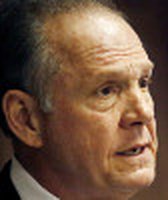Stand up for the facts!
Our only agenda is to publish the truth so you can be an informed participant in democracy.
We need your help.
I would like to contribute

U.S. Sen. Rand Paul, R-Ky., shows a Medicaid card for his son during an appearance on ABC's 'This Week.'
In defending the Affordable Care Act, Democrats often point to Kentucky as a success story, where one in six uninsured residents of the state found health care since the insurance marketplaces opened.
Not so fast, says Sen. Rand Paul, a Republican from the Bluegrass State and a vocal critic of President Barack Obama’s health care law. During a Jan. 5 segment on ABC’s This Week, the first-term senator shared his personal experience with the state’s online tool to purchase coverage, and he said it wasn’t so seamless.
"The other day, I actually tried to get my son signed up through the Kentucky exchange, you know, that the Democrats have said is so good. And I have here my son's Medicaid card," Paul said, holding up the card. "We didn't try to get him Medicaid, I'm trying to pay for his insurance. But they automatically enrolled him in Medicaid. For a month, they wouldn't talk to us because they said they weren't sure he existed. He had to go down to the welfare office, prove his existence. Then the next thing we know, we get a Medicaid card."
Paul went on to claim that "most of the people in Kentucky are automatically being enrolled in Medicaid" and later added that he doesn’t know if he himself is enrolled in Kentucky or Washington.
Wait. Go back for a second. Paul, who earns a senator’s salary and is a well-known ophthalmologist back home, has a son on Medicaid, a program designed to help the poor?
This wasn’t our usual fact check, but Paul’s comments gained national attention at an important moment in the health care law’s implementation, so we thought it deserved greater explanation.
We’ll tell you upfront that we’re not going to be able to give a rating to Paul’s claim that his son was incorrectly enrolled in Medicaid. For one thing, the state of Kentucky can’t divulge information about an individual’s application.
But we can shed light on the process Paul went through and what is supposed to happen.
Corroborated facts
Let’s start with the basics.
Paul has three sons. Two are minors while his oldest child, William, is a legal adult in his early 20s.
Paul’s office confirmed he was talking about his eldest son on This Week. That makes sense; his two minor children would only be eligible for Medicaid through the Children’s Health Insurance Program if Paul and wife Kelley made less than 218 percent of the federal poverty level (about $60,102 for a family of five). That is certainly not the case. As a U.S. senator, Paul is entitled to $174,000 a year in salary.
Medicaid is a joint federal-state health care program for the poor. Under Democratic Gov. Steve Beshear, Kentucky forged ahead with the expansion of Medicaid under the Affordable Care Act. The state now accepts most adults making less than 138 percent of the federal poverty level. For an individual, that equates to an annual income of $15,856 in 2013.
Kentucky is also one of 16 states operating its own online marketplace — a portal for uninsured residents to purchase coverage. In Kentucky, it’s called Kynect, and the site has assisted 123,543 of the state’s 640,000 uninsured residents in gaining health benefits as of Jan. 7. Unlike the federal government website, there have been far fewer reports of problems since going live Oct. 1.
Paul is right about the numbers when he said most people in Kentucky signing up for health care were enrolled in Medicaid. About 90,250 individuals have been enrolled in Medicaid while 33,290 have picked private insurance plans.
Different stories
On This Week, Paul started off by noting that he, too, is in the market for insurance. The Affordable Care Act requires all members of Congress to purchase private coverage in the marketplaces, stripping them of their federal health care plans.
This actually brings us to an important question: Why didn’t Paul simply add his son to his own insurance?
The health care law allows children to remain on their parents’ policy until the age of 26, even if they’re away at school or not living at home anymore. Assuming Paul picked a plan that covers children (remember, he has two minors still at home), he could have added his oldest son directly in the marketplace when he purchased insurance for himself.
But Paul chose to find insurance for his son separate from his own plan. There’s a good explanation for this: Paul bought coverage through the Washington marketplace, his office said, which he is eligible to do, but decided a local plan made more sense for his Kentucky-resident son.
This, Paul said, is when things became difficult.
According to Paul, when he attempted to use Kynect, "they weren't sure (his son) existed." As a result, his son had to go to the welfare office to "prove his existence."
Gwenda Bond, a spokeswoman for the Kentucky Cabinet for Health and Human Services, said no one who applies for insurance would be told they don’t exist. But it is possible that Kynect would have trouble identifying an individual.
To verify users, the system uses Experian, a global information service that also runs credit reports, to ask questions only the applicant would know. Sometimes Experian doesn’t have enough information on someone to provide questions (like, say, a 20-something-year-old with little credit history). And sometimes Experian’s information is wrong or the individual incorrectly answers a question. In those cases, applicants may be asked to provide more information about themselves, either by mail, electronically or in person. This happens about 7 percent of the time, Bond said.
Going down to the welfare office (in Kentucky, it’s called the Department for Community Based Services) is one way a person can deliver information to verify their identity.
At the local office, Paul’s son was specifically asked if he had a plan picked out, and he indicated he did not, according to Paul’s spokesman. But his son somehow received a Medicaid card in the mail soon after. "At no time did anyone in the Paul family affirmatively opt into any option for Medicaid," the spokesman said.
Bond said no one eligible for Medicaid should be enrolled unless they applied for the program and are determined eligible. Before they get far in the account creation and application process, individuals are provided options for finding coverage, and one of them is shopping for plans without applying for Medicaid or federal subsidies. (After we initially published this report, Bond sent us screenshots of the Kynect website that users see when signing up for coverage. There is a clearly marked option early in the process for people who want to shop without a subsidy or Medicaid.)
Paul said he and his son, whom he claims as a dependent on his taxes, are not eligible for Medicaid because of the family’s household income. Therefore, his son was incorrectly awarded Medicaid coverage.
According to the health care law, someone who is listed as a dependent cannot apply for Medicaid. In fact, on Kentucky’s paper application for financial assistance through Obamacare, it specifically asks if you are a dependent. If you are, it tells you to "Stop using this form. You will need to apply for coverage with the person claiming you on their tax return."
Kentucky also points out that dependents (or anyone purchasing insurance who doesn’t want financial assistance) can buy a policy directly from a broker, without using the online tool.
User or system error could explain why Paul received a Medicaid card. Perhaps the applicant incorrectly failed to identify himself as a dependent on the paperwork. There are systems in place to check the tax status of an application, Bond said, but it’s possible an individual slipped through and was provisionally enrolled in Medicaid until other verification methods (such as the upcoming year’s tax filings) were processed.
Because Kynect staff cannot comment on Paul’s son’s application, it leaves us with a quasi he-said-she said situation. Paul said his son never indicated he wanted Medicaid; Kentucky officials say that he shouldn’t have been enrolled if that was the case.
It is possible for someone who fits William Paul’s description — a young adult under the age of 26 who makes less than $15,856 and is applying for health care coverage separate from his parents — to qualify for Medicaid, even if the parents do not. But if he had told officials he was someone else’s dependent, he should not have qualified.
Clearly, a dependent with out-of-state parents applying for insurance isn’t a typical situation. Maybe one of the Pauls made a mistake on the paperwork. Or maybe the state marketplace made the mistake and directed Paul to the wrong coverage. We can’t really know for sure either way.
Update: This report has been updated to include screenshots of the Kynect website we received after our initial publication.
Our Sources
Sen. Rand Paul interview on ABC’s This Week, Jan. 5, 2014
ABC News, "Sen. Rand Paul Says Obamacare ‘A Mess,’ Unsure if Family is Covered," Jan. 5, 2014
Email and phone interviews with Gwenda Bond, spokeswoman for the Kentucky Cabinet for Health and Human Services, Jan. 6-8, 2014
Interviews with Brian Darling, spokesman for Sen. Rand Paul, Jan. 6-8, 2014
HealthCare.gov, "What income and household information do I provide when I apply for Marketplace coverage?" accessed Jan. 8, 2014
HealthCare.gov, "Can children stay on a parent’s plan until age 26?" accessed Jan. 7, 2014
The Henry J. Kaiser Family Foundation, "How Will the Uninsured in Kentucky Fare Under the Affordable Care Act?" Jan. 6, 2014
Kentucky.gov, "What is KCHIP?" accessed Jan. 7, 2014
National Archives and Records Administration, "Annual Update of the HHS Poverty Guidelines," accessed Jan. 7, 2014
HealthCare.gov Glossary, "Federal Poverty Level," accessed Jan. 7, 2014
Roll Call member profiles, Sen. Rand Paul, accessed Jan. 6, 2014
The Commonwealth Fund, "State Action to Establish Health Insurance Marketplaces," July 2013
Kynect website, "kynect Guide to Portal," accessed Jan. 6-8, 2014
Yahoo! Finance via PR Newswire, "Experian Healthcare launches tool to enable providers to identify and help enroll eligible individuals for health insurance exchange (HIX) subsidized programs," Sept. 23, 2013
Kentucky Cabinet of Health and Family Services, "Kentucky Medicaid and You," accessed Jan. 8, 2014
Kynect website, "Frequently Asked Questions," accessed Jan. 7-8, 2014
Kynect website, Kynect Health Coverage & Help Paying Costs Application, accessed Jan. 8, 2014
Email interview with Aaron Albright, spokesman for the U.S. Department of Health and Human Services, Jan. 7-8, 2014
















































